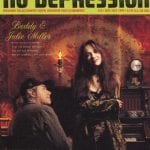Box Full of Letters from Issue #23
Gram Parsons:
Under his spell again
I had just finished belting out the final verses of “That’s All It Took”, singing along with Gram and Emmylou while cleaning house on a Sunday morning, when I paused to rip open the mailer containing the latest No Depression. A perfect beat after the pedal steel whine faded out, Parsons’ slyly caricatured face popped out of the envelope. Another example, for me at least, of his mysterious timing.
I just discovered his ecstatic harmonies with Emmylou a few months ago (my wife gave me GP/Grievous Angel for Christmas on a hunch, and after a few “don’t get it” listenings it burst open for me), and I’m not informed enough to join in on the Parsons-as-torchbearer debate. Parsons was erratic, and perhaps the worshipful following does have more to do with his Joshua Tree death and his rakish charm. All I know is that this summer I can’t stop listening to him and Emmylou.
Early in June, heartbroken by saying goodbye to my lovely class of fourteen East Austin fourth-graders, I cleaved to songs like “Return Of The Grievous Angel”, “$1,000 Wedding” and “In My Hour Of Darkness”. Now that I’m in my teacher-in-summertime mode, I’m relishing the ripping country ballads. They all shimmer. There is some harmonic resonance in those two voices in full flight that defies explanation and makes rock-critic pigeonholing irrelevant. Listen to an uncannily confident Parsons on the Fallen Angels’ Live 1973 album, telling an audience of laid-back groovers, “Y’all wanted a Merle Haggard song? Here comes a Merle Haggard song,” then ripping into a soaring version of “California Cotton Fields”. The band is tight and inspired, the singing breathtakingly wise for two twentysomething kids. That track captures some of the alchemy that hooks new fans like myself: a sense of fun, of vulnerability, of deep respect for tradition, quality musicianship, and an indefinable essence from Parsons himself — I guess I’d call it soul.
I’ve sung along to “Cotton Fields” a dozen times the past few days and not tired of it yet. I think even if Emmylou Harris had silently “settled into a housing complex,” as Mr. Alden imagined it, I’d still be rolling down the Texas highways, happily singing along at the top of my lungs, trying to get to where she and Gram are pointing with each sweet chorus.
— Clayton Stromberger
Austin, Texas
Looking for Love:
A plea for Vigilante justice
Just a general thank you for what I take to be a culturally crucial publication. My admiration began with that Victoria Williams/Mark Olson cover [ND #13, Jan.-Feb. ’98], and ever since then I’ve looked hard in your direction to unearth a lot of what’s good for me. Olson’s back page on the latest, Gram Parsons-focused issue had me all the more appreciative. I think you’re making the world a finer place. You are broadening the context.
Squeezed somewhere in there is an advertisement for a band called Vigilantes of Love, whose leader, Bill Mallonee, Buddy & Julie Miller (according to the ad, for which I know you’re not responsible) deem right up there with Bob Dylan. How could a group esteemed so highly by such an authority go so long uncommented upon?
Thanks for affirming my enthusiasms (translation: making me feel all cool when you write about people I’m already into) and constantly introducing me to more.
— David Dark
Nashville, TN
Old and in the way:
You want mint jelly with that?
First of all, thanks for your terrific work. Rereading the last issues, I got the impression that your writers (and the editors) are looking for the next thing that will change their lives. You will not find it. We’re gettin older in the same way as Jeff Tweedy, Bob Mould and all the others, and yes, maybe from a certain point of view, we’re kind of boring.
And it is really a miracle why the best damned circus on this planet in the last few years didn’t get a cover story in No Depression. I’m speaking of Lambchop, the band that destroys doubts and all the other bullshit, the band that makes a grown man cry, the band that made it clear that my youth was not wasted in all those clubs and beerjoints.
Kurt Wagner has a lot to tell about a lot of aspects of Nashville, about growing old and surviving doing his thing, about daytime jobs, and about art. It’s really a joy talking to him. Maybe they have more friends over here, and maybe I love this band this much and have written too much about them, but come on, give it a try. They belong on the cover!
— Gunther Schweiger
Austria
Shel Silverstein:
Thanks to Bare Jr.
I would like to thank Bobby Bare Jr. for his contribution in the July-August issue [ND #22] I wish it was longer, because it was great to read. As a Shel Silverstein fan myself, I wish those original albums by Bobby Bare are going to be reissued soon. Although too late for Shel himself, it will be a great testimony of his capabilities as songwriter and as an artist.
–Vincent
Netherlands




